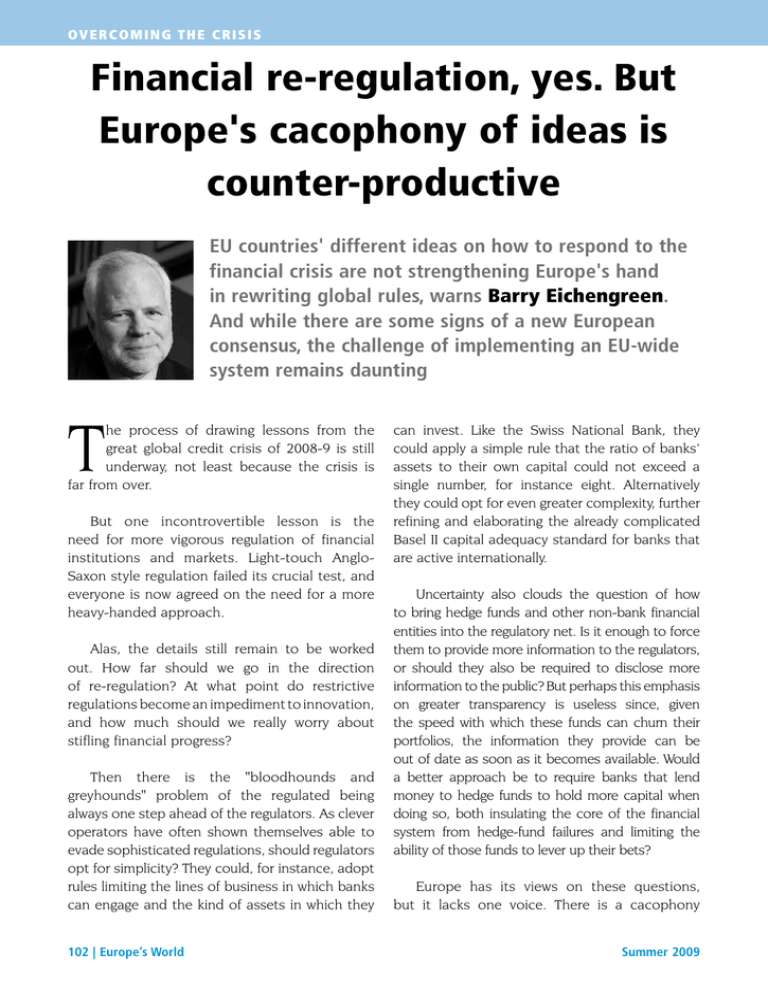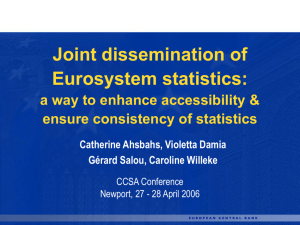Financial re-regulation, yes. But Europe's cacophony of ideas is counter-productive
advertisement

overc o ming th e crisis Financial re-regulation, yes. But Europe's cacophony of ideas is counter-productive EU countries' different ideas on how to respond to the financial crisis are not strengthening Europe's hand in rewriting global rules, warns Barry Eichengreen. And while there are some signs of a new European consensus, the challenge of implementing an EU-wide system remains daunting T he process of drawing lessons from the great global credit crisis of 2008-9 is still underway, not least because the crisis is far from over. But one incontrovertible lesson is the need for more vigorous regulation of financial institutions and markets. Light-touch AngloSaxon style regulation failed its crucial test, and everyone is now agreed on the need for a more heavy-handed approach. Alas, the details still remain to be worked out. How far should we go in the direction of re-regulation? At what point do restrictive regulations become an impediment to innovation, and how much should we really worry about stifling financial progress? Then there is the "bloodhounds and greyhounds" problem of the regulated being always one step ahead of the regulators. As clever operators have often shown themselves able to evade sophisticated regulations, should regulators opt for simplicity? They could, for instance, adopt rules limiting the lines of business in which banks can engage and the kind of assets in which they 102 | Europe’s World can invest. Like the Swiss National Bank, they could apply a simple rule that the ratio of banks’ assets to their own capital could not exceed a single number, for instance eight. Alternatively they could opt for even greater complexity, further refining and elaborating the already complicated Basel II capital adequacy standard for banks that are active internationally. Uncertainty also clouds the question of how to bring hedge funds and other non-bank financial entities into the regulatory net. Is it enough to force them to provide more information to the regulators, or should they also be required to disclose more information to the public? But perhaps this emphasis on greater transparency is useless since, given the speed with which these funds can churn their portfolios, the information they provide can be out of date as soon as it becomes available. Would a better approach be to require banks that lend money to hedge funds to hold more capital when doing so, both insulating the core of the financial system from hedge-fund failures and limiting the ability of those funds to lever up their bets? Europe has its views on these questions, but it lacks one voice. There is a cacophony Summer 2009 of voices – the European Commission and the Parliament, the European Central Bank (ECB) and the individual member states – all shouting out conflicting advice and instructions. Now the fear is that Europe will not pull its weight in the international arenas where these issues are decided because its various representatives will pull in opposing directions. And that would mean that the United States will be able to play the Europeans off against one another. There are some grounds for this fear. France, Germany, Italy, the Netherlands and the UK all have their own representatives in the Financial Stability Forum, the body launched 10 years ago by the G7 governments that now includes China and is tasked with agreeing the broad outlines of a new international regulatory architecture. The EU has as many as eight Executive Directors on the board of the IMF, which it is supposed will be responsible for overseeing implementation of those regulations and monitoring compliance. The much more broadly based Group of 20, which brings together industrial and emerging market economies, includes a wide range of European Union representatives, such as France, Germany, Italy and the UK but also the current holder of the EU’s revolving presidency and the president of the ECB. Having so many representatives should be a good thing for Europe, so long as they sing the same song. But the worry is that they will not sing in harmony. Where Britain pushes for light-touch regulation, France favours a more heavy-handed approach. Within the European Commission, Charlie McCreevy, who is responsible for the single market, remains opposed to significant re-regulation, while Joaquin Almunia, the commissioner for financial affairs, favours more ambitious regulation. The result, it is argued, is that neither the Commission nor the member states are able to shape the global debate. In reality, this worry is increasingly anachronistic. There is in fact a growing consensus in Europe about what needs to be done and how to do it. Summer 2009 Commentary By Marek Belka and Wim Fonteyne The bullet Europeans aren't biting is pooling their fiscal resources B arry Eichengreen rightly identifies two major challenges that Europe faces in the era of re-regulation triggered by the global financial crisis. The first is to ensure that its views are reflected in international regulatory standards, and the second is to enforce these regulations in its own, largely integrated, market. His proposed remedy is to make the European Central Bank (ECB) the single consolidated supervisor for the European market. Eichengreen is thus advocating a very different approach to the de Larosière Group (“The “Group”), whose recommendations were endorsed as a basis for action by the European Council in March. The Group proposes a new body – the European Systemic Risk Council (ESRC) – that would be separate but closely linked to the ECB, and whose macro-prudential oversight mandate would mean overseeing risks related to general economic and financial developments. Microprudential oversight of individual institutions would continue to be exercised by national supervisors, brought together in colleges for cross-border groups. These supervisors and colleges would, however, operate under the oversight of three sectoral supranational Authorities, with which they would form a European System of Financial Supervisors (ESFS). Is Eichengreen’s proposal preferable? Having the ECB function as its representative would Europe’s World | 103 overc o ming th e crisis An important factor is that the British, having experienced one of the most searing financial crises in all of Europe, have lost faith in light-touch regulation. The public and parliamentary backlash against the bankers is evidence that the ability of financial market participants to shape British policy in their own favour is not what it once was. The same is true in Ireland, where Commissioner McCreevy hails from, so he may find his de-regulatory legs cut out from under him. should take. But neither is there complete agreement within the United States, where Barney Frank, chairman of the House of Representatives' Financial Services Committee, Treasury Secretary Tim Geithner, Federal Reserve Board Chairman Ben Bernanke, and the new heads of the Securities and Exchange Commission (SEC) and Federal Deposit Insurance Corporation are not always on the same page. The U.S. is represented in the Financial Stability Forum by the Treasury, the SEC and the Federal Reserve Board, who don’t always speak with one voice. While more harmonisation among EU representatives in the venues where the new global financial architecture is being designed is clearly desirable, the same is also true of the representatives of the United States. To be sure, there remains less than full agreement in the EU on the form that re-regulation Where Europe is at a clear disadvantage, though, is in effectively implementing those France and Germany agree on the need for stricter oversight of the hedge fund industry. They agree that this should be done through both enhanced disclosure and increased capital requirements for banks providing credit to hedge funds. Matters of opinion Europeans say G8 is best qualified to deal with the crisis, IMF the least so EU citizens believe that the body most capable of dealing with repercussions of the financial and economic crisis is the G8 group of industrialised nations, ahead of other international bodies and nations states. In your opinion, which body is capable of dealing most effectively with the repercussions of the financial and economic crisis? 30 A Eurobarometer survey in January-February 2009, found that one in four of the 27,000 people questioned believe the G8 could deal most effectively with the crisis, putting it well ahead of the EU (17%), the U.S. (15%), or the individual’s own national government (14%). The IMF received the least support with 10%. Romanians, British and Irish people expressed the greatest confidence in their national government’s ability to deal with the crises and its repercussions. A third of Romanians (32%) thought their government better equipped than any of the other bodies cited. Member states with a quarter of citizens or more putting the EU top of the list were Greece, Cyprus, 104 | Europe’s World 25% 17% 20 10 15% 14% 10% 13% 0 G8 EU U.S. National IMF government Don’t know Source : Eurobarometer 2009 Poland, Luxembourg, Estonia and Hungary. People in the UK and the Nordic countries (Sweden, Denmark and Finland) were the least enthusiastic about the EU’s crisis management abilities, with just 6% of Britons selecting this option. Summer 2009 regulations. The lesson of the crisis is not merely the importance of having appropriate regulations; it is the importance of enforcing them. This means preventing banks from moving their operations to the most lenient jurisdictions so as to avoid the intent of the law, something that in turn requires the close harmonisation of national regulations. It means that financial conglomerates and banks operating in multiple countries should be subject to consolidated supervision. They should not just have those bits and pieces of their operations in a particular country overseen by the regulators of that jurisdiction. Finally it means that the provision of emergency liquidity – the lender-of-lastresort function – must be closely coordinated with the sort of supervision and regulation that should be designed to head off problems before they occur. This is where Europe faces especially difficult challenges. Because many of the EU's members are small, and because the single market is an established fact, cross-border banking is especially extensive. Some 70% of bank assets in the EU are in the hands of banks operating in a number of countries. No single national regulator, including that of the country in which they are incorporated, can adequately handle their affairs. A “college” of national supervisors working together to oversee each cross-border bank would still be woefully inadequate. The academics among us will be reminded of faculty meetings in their own colleges, where each member gets a say but in the end nothing is decided. We have had colleges of supervisors in the past, and they glaringly failed to head off problems in crossborder financial institutions. The need is for a single consolidated supervisor for the single European market. But if the EU vests this responsibility with a new institution, then it would be setting itself up for the kinds of problems that the UK experienced with Northern Rock, where the supervisor and the lender of last resort proceeded under different Summer 2009 Commentary Marek Belka and Wim Fonteyne give Europe a single voice that is lacking in the Group’s proposals. There are also many reasons to believe that the ECB would be a more effective consolidated supervisor than the standardised colleges the Group proposes, not least because it would centralise information and decision-making, and would more naturally bridge macro- and micro-oversight. The Group’s proposals win on feasibility, however, as they are designed to work around the many existing obstacles and avoid the need for EU treaty changes. Accountability concerns also argue against taking the ECB route that Barry Eichengreen advocates. Consolidating monetary policy and financial supervision in the ECB not only risks conflicts between both mandates, it might also make the ECB too powerful for its own good. Politicians are unlikely to allow such a powerful institution full independence, especially if it represents the EU on the world stage and when, inevitably, cases of perceived supervisory failure occur. Separate accountability channels for both mandates would be needed. A more fundamental problem is that – to paraphrase the Bank of England's Governor Mervyn King – pan-European banks are European in life but national in illness and in death. Lender of last resort support remains the responsibility of national central banks, with the fiscal backing of their Treasuries. Dealing with bank insolvencies also remains a national responsibility. The current crisis has shown how high the resulting fiscal costs can be. As long as national Treasuries are directly liable for these costs, they will want control over supervision. This stands in the way of any move toward genuine supra-national supervision and may also impede the functioning of the ESFS, as the Europe’s World | 105 assumptions. But if, on the other hand, this responsibility is vested with the ECB, then it will be exercised by an entity in which important EU members, notably the UK, have little say. Two clear if unrealistic solutions suggest themselves. One is for the members of the single market that have not yet adopted the euro to do so. The ECB could then act as the single consolidated supervisor for the entire EU, delegating various information-gathering and enforcement functions to the national members of the European System of Central Banks. The second is for EU members reluctant to adopt the euro to get out of the single market. Countries like the UK could then have their own national currency, national supervision and national financial market. They could cooperate with the U.S., the EU and others as they saw fit. Ultimately, one of these solutions, most likely the first, will come to pass. But neither will come about anytime soon. In the short run the best outcome would be to make the ECB the consolidated supervisor for the euro area and to build mechanisms enabling it to more closely coordinate with other European supervisors. College-of-supervisor problems there still will be, but they will be mitigated by smaller numbers. Among other things that need to be created, a single eurozone supervisor would help to cultivate a single eurozone position on global financial reform, and a single eurozone voice on how to do it. France, Germany, Italy and the Netherlands can then give up their separate seats in the Financial Stability Forum, the IMF, and the other global venues where these deliberations are carried out. When that happens, the eurozone will no longer be condemned to punch below its weight. Commentary Marek Belka and Wim Fonteyne constituent national supervisors will continue to face incentives to minimise the costs to their own Treasury. To ensure the success of the Group’s proposals and to give Europe the option of more fundamental reforms over time, this reality should be changed. What is needed is a cross-border safety net for pan-European banks. Such a safety net must combine a special insolvency regime that ensures the cost-efficient resolution of a failing bank and allocates losses as much as possible to shareholders and creditors, with a privately-funded insurance scheme to fund resolution efforts with a view toward protecting depositors. The safety net should minimise the need for fiscal resources, while having access to them as a back-up option. Such fiscal backing can be provided either through some binding distribution mechanism or through increased availability of fiscal resources at the EU level. Technically this can be done, and the crisis should be motivating European politicians to bite the bullet. Barry Eichengreen is George C. Pardee and Helen Marek Belka is Director and Wim Fonteyne N. Pardee Professor of Economics and Political a Senior Economist in the International Science at the University of California, Berkeley. Monetary Fund's European Department. eichengr@econ.Berkeley.EDU wfonteyne@imf.org Summer 2009 Europe’s World | 107



